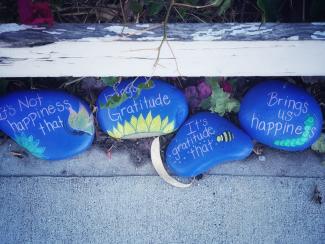
Gratitude and Gratification
“Gratitude is riches. Complaint is poverty.” —Doris Day
A lot of the difficulty with planning is that it requires delaying gratification, and instant gratification feels so good! You know what else feels good though? Gratitude[i]!
“When we express gratitude and receive the same, our brain releases dopamine and serotonin, the two crucial neurotransmitters responsible for our emotions, and they make us feel ‘good’.[ii] David DeSteno, professor of Psychology at Northeastern University[iii].
Most of our fear and greed impulses evolved hundreds of thousands of years ago from scarcity or dangers that we have significantly reduced in most parts of the modern world. If we can appreciate what we have right now, it becomes much easier to save some more for the future. Sometimes we must consciously list the things that we have in order to realize that our needs are actually met. “Be thankful for what you have; you'll end up having more. If you concentrate on what you don't have, you will never, ever have enough.”
—Oprah Winfrey
It’s very human to feel like there isn’t enough. Do not forget the words of Epictetus “Whoever does not regard what he has as most ample wealth, is unhappy, though he be master of the world.”
We are only here today because of the fear and greed selected for in our brains by evolution. The problem is that deeply ingrained impulsivity that was key for the immediate survival of our ancestors can be counterproductive today. Early humans who didn’t fear scarcity and take advantage of opportunity died before passing on their genes.
We evolved to survive; we plan to thrive.
It’s easy to forget that we have the same brains as hunter gatherers, this makes us great at surviving in the moment, and absolutely terrible at financial planning. That’s the bad news.
The good news is that studies have suggested “…that people who had higher levels of gratitude in their daily lives were more patient and less impulsive when it came to those financial decisions,”[iv]
“Specifically, we found that (a) the emotion gratitude reduces impatience even when real money is at stake, and (b) the effects of gratitude are differentiable from those of the more general positive state of happiness. These findings challenge the view that individuals must tamp down affective responses through effortful self-regulation to reach more patient and adaptive economic decisions.”[v]
Practicing gratitude doesn’t cost you anything, but failing to practice gratitude could lead to expensive mistakes. In addition to the fact that we know that it feels good to express or receive gratitude we now have mounting evidence that it can help us plan for the future while appreciating the present. So here are some suggestions of actionable ways to be more intentionally grateful.
- Journal or Jar: Each day, set aside a few minutes to write down something, or a few things, you’re grateful for that day. You can use a journal or small pieces of paper you put in a jar. Review your journal or pick from the jar when you are struggling.
- Appreciate nature: go for a walk outside and notice the things you might otherwise take for granted that you’re surrounded by. The smells or sounds, the shade of a tree the quietness of snow.
- Mindfulness meditation: Reflecting, being present, being aware of and appreciating the moment.
I am thankful that I don’t need to create a long list of how to practice gratitude because those lists are numerous and easy to find with a quick internet search. I will just leave you with one more quote to ponder.
“Make it a habit to tell people, ‘thank you.’ To express your appreciation sincerely and without the expectation of anything in return. Truly appreciate those around you, and you’ll soon find many others around you. Truly appreciate life, and you’ll find that you have more of it.” —Ralph Marston
Thank You!
[i] https://www.princetonhcs.org/about-princeton-health/news-and-information/news/can-gratitude-increase-quality-of-life#:~:text=Brain%20Chemicals,%2C%20and%20overall%20well%2Dbeing

